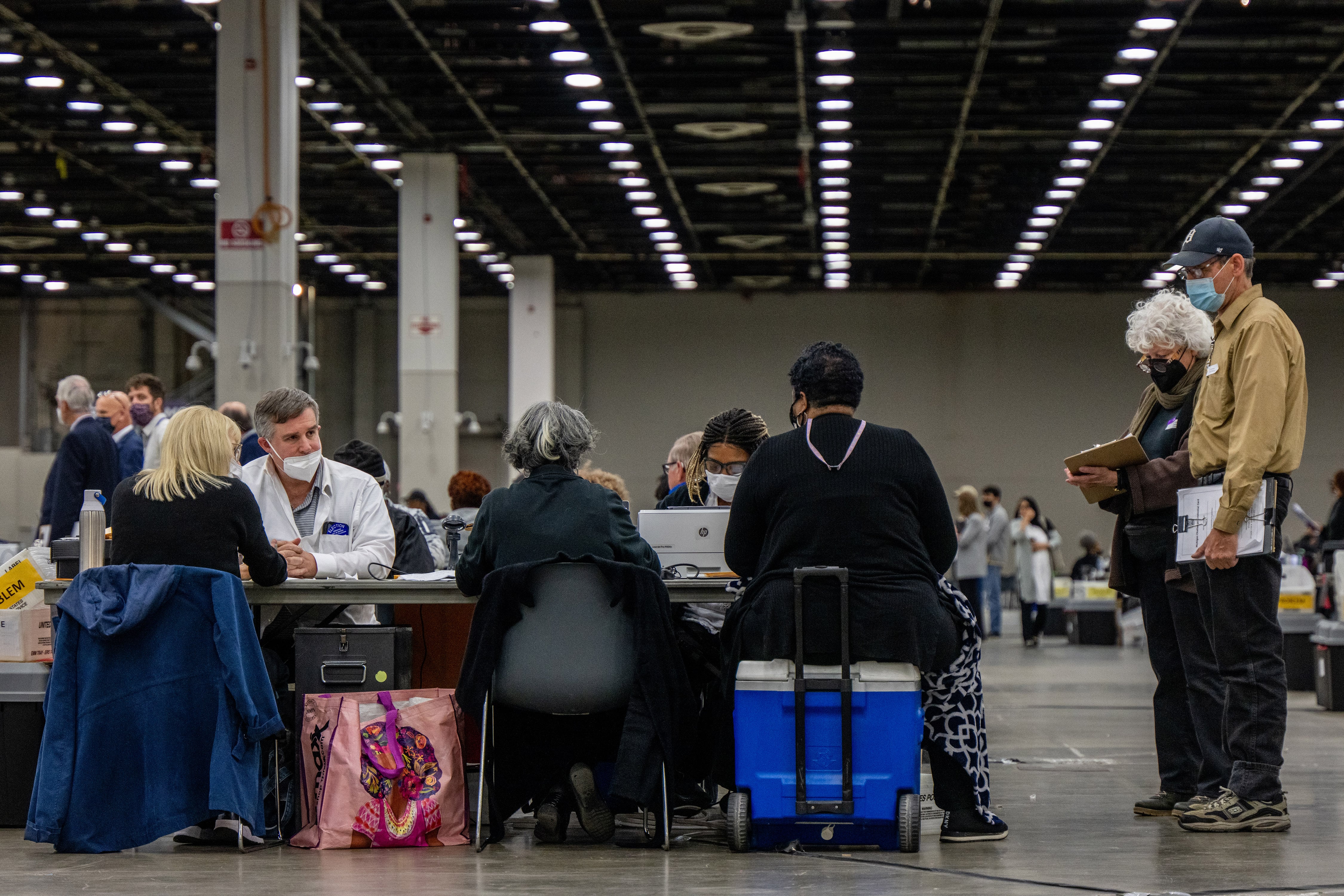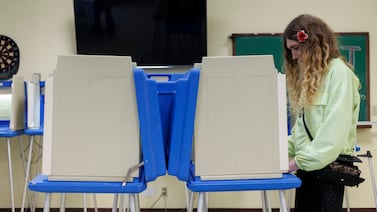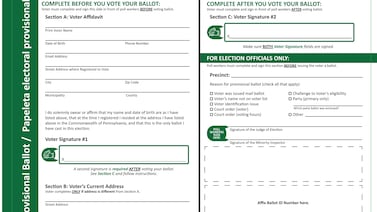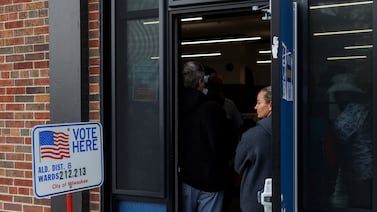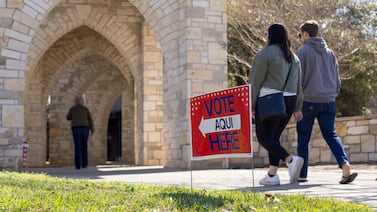Votebeat is a nonprofit news organization reporting on voting access and election administration across the U.S. Sign up for Votebeat Michigan’s free newsletter here.
Michigan poll challengers face stricter rules going into the November election, part of a wave of new requirements that aim to prevent some of the disruptions that marred the ballot counting process four years ago.
Poll challengers — distinct from poll workers and poll watchers — are individuals stationed at polling places and vote-counting centers who have unique powers under Michigan law to challenge a voter’s eligibility or question the way officials are doing their jobs.
Their role in Michigan elections drew national attention in 2020, when some poll challengers who were kept out of a ballot processing center in Detroit that was filled to capacity began banging on the windows and demanding a halt to the count.
Many of the new rule changes are small but targeted at averting such conflicts that could delay vote counting. The most significant changes focus on how challengers are allowed to behave — for example, a poll challenger could be removed from the facility if they make repeated challenges that don’t pass legal muster, or “impermissible” challenges.
“I think these rules are going to help counting be accomplished more quickly,” said David Jaffe, who has served as a poll challenger in Detroit in almost every election since 2018.
He’s seen instances where challengers report the same minor, often-impermissible complaints to liaisons across a counting center, alleging that something about the way workers are counting ballots violates state law. Their goal is to get someone to take up that challenge — even if the process in question isn’t illegal — and to change the counting process, which slows the work for everyone.
In August 2022, Votebeat reported, a rogue challenger was the only significant disruption to an otherwise quiet primary day.
“This hopefully means counting can be done more expeditiously and that challengers will be focused on the right things, which is pointing out any errors that happen along the way and getting them corrected,” Jaffe said. “There’s not very many, but it’s a repetitive process.”
Who are poll challengers, and what can they do?
Many states allow observers to be present at the polls, but in Michigan, credentialed poll challengers have added power to question the eligibility of a voter or even the way ballots are processed.
Almost anyone can be a challenger, but they must follow specific rules. To serve as a challenger, a person must be registered to vote in Michigan and credentialed by a specific organization for each election they want to work. Credentialing organizations can be political parties or external organizations, such as the ACLU or the League of Women Voters, that are approved by a community’s clerk. Candidates and their campaigns cannot give credentials.
Local officials generally try to ensure that poll challengers at a given polling place are evenly split between the two major parties.
There are no training requirements for challengers. But the credentialing groups are encouraged to make sure that they have basic knowledge about what is and is not allowed, so that they can “make informed challenges without disrupting or delaying election-related activities,” the 2024 guide says.
Like poll watchers, challengers observe what’s happening. But they have two main added powers: They can question whether a voter is actually allowed to vote, as long as their challenge is based on whether the person meets age, citizenship, registration or residency requirements. And they can notify officials of any potential violation of election law, such as electioneering at a polling place.
At a polling place, a challenger who questions a voter’s eligibility has to have some cause to believe a voter isn’t allowed to cast a ballot — the person’s race or difficulties speaking English are not valid reasons, as noted in the 2024 guidelines.
Challengers at a polling place can also inspect printed materials like ballot applications and registration lists, but they can’t touch them or impede with voting. They’re allowed to stand behind the processing table, but they can’t touch the poll book that poll workers use to check in voters.
At an absentee voter counting board — where ballots cast by mail are processed — challengers can monitor how the ballots are being processed. They’re allowed to be close enough to the poll books to view names, but again, they aren’t allowed to handle anything themselves.
In both cases, poll challengers are not allowed to talk to or interact with voters. They’re also not allowed to record audio or video.
Lisa Posthumus Lyons, Kent County clerk, said challenging can be “very touchy.”
Challengers can’t issue blanket challenges against a specific voter, she said during a gathering in Ann Arbor last week of election officials from around the country. Rather, they would have to know enough about the voter to be able to argue specifically why they wouldn’t be eligible. Oftentimes, that requires knowing the voter personally, she said.
“It needs to be done delicately and properly,” Posthumus Lyons said.
It “isn’t a weapon — it’s a tool,” that’s intended to allow citizens to help ensure the voter rolls are accurate, she said.
Chris Thomas, the former state director of elections who now helps Detroit run its elections, told Votebeat that the presence of poll challengers at polling places and counting boards can help keep elections running smoothly and can minimize potential false accusations of cheating, by allowing people to watch what’s happening and flag potential problems in real time.
“People need to be able, through their organizations, to see it,” he said.
Michigan also allows poll watchers, who do not need to be credentialed. Municipalities may limit poll watchers to a number that “does not cause the process to be disrupted,” according to the 2024 guidelines released earlier this month. Poll watchers are more limited than challengers in where they can be and who they can interact with.
What the new guidelines for Michigan poll challengers say
Secretary of State Jocelyn Benson’s guidelines for poll challengers have doubled in length from 2020, in part to accommodate changes and clarify some of the existing rules.
Some of the biggest changes came into effect in 2022. They include a requirement that the challenger’s credentials must be the specific form offered by the Secretary of State’s office (in previous years, anything with the required information would suffice); a rule that challengers can talk only to specific “liaisons” at polling places; and a note that poll workers don’t need to document impermissible challenges.
Some of the rules were the subject of a court challenge in 2022 from plaintiffs who argued that they were not enacted properly. The Michigan Supreme Court in August ruled that Benson has the right to set rules for challengers and that most of the rules she proposed were acceptable.
The newest set of rules, issued earlier this month, acknowledges the suits and says the regulations issued for 2024 act within the bounds the judge set.
Other noteworthy changes to the challenger guidelines include clarity on how a clerk can limit the number of challengers based on the size of the room and the number of processing teams, as well as a new rule that challengers in an absentee vote counting board cannot challenge the eligibility of a voter, as they can in a polling place. That’s because voters have the right to respond to challenges to their eligibility, which they couldn’t do in an absentee counting board.
Those challenges were a source of disruption and conflicts with poll workers in the past.
“People tried that in 2022 and they couldn’t pull it off, but now we won’t allow it at all,” Thomas said.
For most voters, the rule changes won’t mean much, he said, but giving state and local officials the opportunity to prevent disruptions is valuable in ensuring that results can come in quickly and accurately.
In Detroit, for instance, under the new rules, local officials won’t tolerate groups of challengers moving from one precinct’s counting board to another, trying to get their challenges to stick even after previous officials rejected it, as Jaffe has seen previously.
Thomas said it’s helpful for election officials to give poll challengers clarity about their inability to challenge voters during absentee ballot counting.
“That’s certainly going to address the big issues that would certainly slow the process down,” he said.
Hayley Harding is a reporter for Votebeat based in Michigan. Contact Hayley at hharding@votebeat.org.

